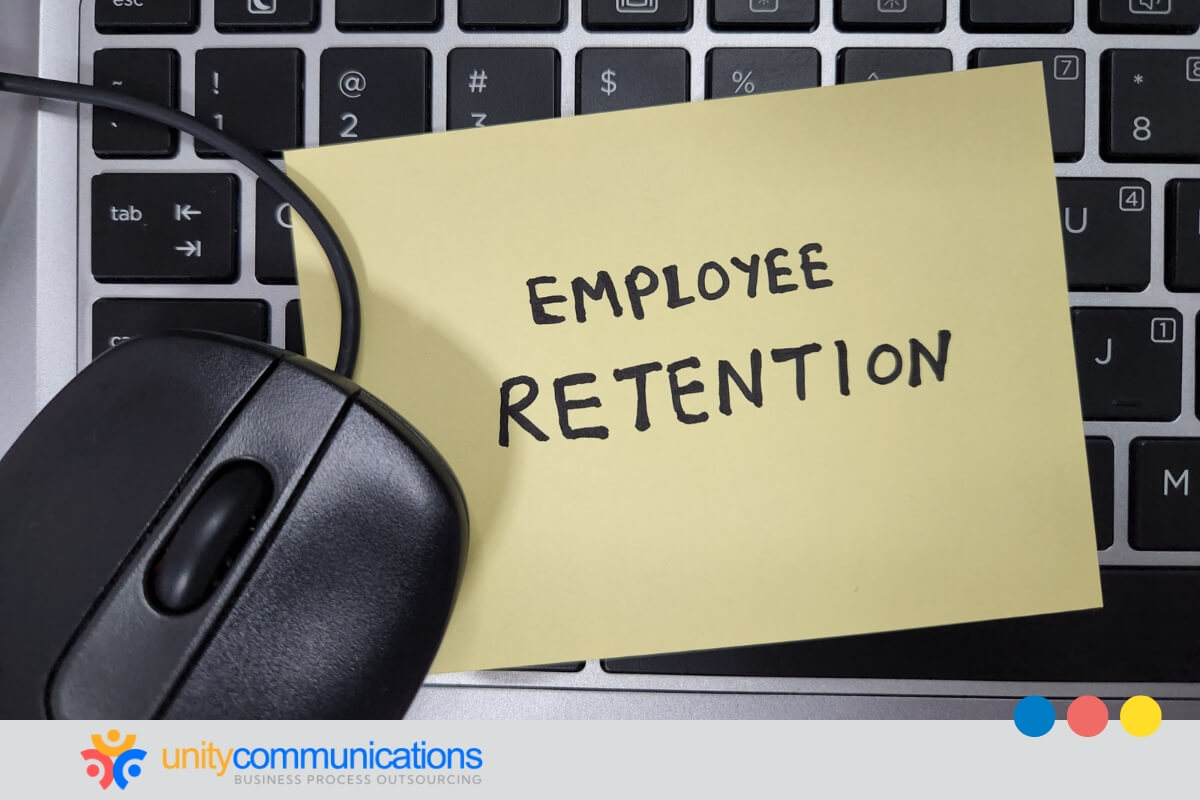IN THIS ARTICLE
Table of Contents
Companies hire third-party service providers to lighten their front- and back-office workloads. Business process outsourcing (BPO) has helped them achieve cost savings and boost daily productivity wherever they are. They can also optimize scalable resources at competitive pricing.
Although most tasks can be accomplished virtually by a dispersed team, finding a BPO provider that abides by critical environmental sustainability guidelines is crucial. It ensures uninterrupted operations while contributing to a more sustainable enterprise landscape.
Are you curious about how service vendors reduce their environmental impact? Read until the end to learn more.
Environmental risks and practices involved in BPO operations

What is BPO without natural resources and energy solutions? The question seems ironic but holds a more profound meaning when appropriately answered.
Outsourcing requires various means to function efficiently. That includes consuming electricity to power up equipment, using water to keep employees hydrated, and opening lights to accomplish business functions effectively. Also, providers often require numerous hard copies of relevant documents.
In short, BPO operations heavily rely on natural and energy resources. The lack of these assets results in prolonged downtime and limited scalability. However, overuse leads to excessive waste, severe pollution, and increased carbon emissions.
BPO organizations thus take steps to ensure environmental sustainability. They maintain eco-friendly operations in these ways:
- Use energy-efficient tools, such as smart building management systems.
- Invest in renewable energy sources such as solar power to minimize carbon footprint.
- Offer remote work options to reduce energy consumption and waste.
- Reduce, reuse, and recycle office materials.
- Establish guidelines for disposing of electronic waste properly.
- Build and operate facilities according to green building standards.
- Implement paperless processes and facilitate digital documentation.
- Engage in carbon offset programs, such as lowering greenhouse gas emissions.
- Source products and services from environmentally friendly suppliers.
- Participate in community projects, such as tree planting and waste management efforts.
- Regularly monitor and report on environmental performance.
- Obtain and showcase relevant green certifications.
- Conduct BPO training on the importance of environmental sustainability.
- Frequently assess and update strategies to stay aligned with sustainability goals.
Major environmental laws impacting the BPO sector
Besides conducting the above business practices, service providers minimize or avoid the risks by knowing environmental laws. They build their industry credibility and maintain their competitive advantage by complying with these legal guidelines across key BPO hotspots:
- The Emergency Planning and Community Right-to-Know Act (EPCRA) mandates companies to report any toxic chemical use, release, or transfer to the U.S. Environmental Protection Agency (EPA). Non-compliance results in fines ranging from $67,544 to $202,635 per daily violation.
- The Philippine Environmental Impact Statement (EIS) of 1978 requires local enterprises to evaluate the ecological effects of their operations. To ensure eco-friendly business activities, they must prepare and submit an EIS to the country’s Department of Environment and Natural Resources (DENR).
- Mexico’s General Law of Ecological Balance and Environmental Protection (LGEEPA) directs firms to perform environmental impact assessments (EIAs). Providers specializing in renewable energy, agriculture, and production are mainly required to report the potential effects of their projects and detail mitigation measures.
- India’s E-Waste Management Rules of 2016 oversee electronic waste generation, collection, and disposal. The law instructs information technology (IT) businesses to gather, eliminate, or recycle e-waste during electronic equipment manufacturing and expiration.
- The European Union (EU) Climate Law sets a 2030 target of lowering net greenhouse gas emissions by at least 55%. It establishes the framework to achieve climate neutrality by 2050.
- The Canadian Environmental Protection Act, 1999 (CEPA) provides guidelines for addressing environmental challenges, from toxic substances to ecological emergencies. It requires emergency plans and EIAs to mitigate any form of pollution.
- The Environmental Protection Law of the People’s Republic of China sets rules and regulations to prevent and control pollution and other public hazards for human health defense. It also facilitates the development of socialist modernization.
Businesses risk costly lawsuits, fines, and operational delays when violating these critical laws. Damaged reputations and potential business closures can also occur, depending on the gravity of the cases.
For instance, the EPA and the U.S. Department of Justice have charged Toyota Motor Corporation a $180 million civil penalty for violating emission-related defect reporting requirements. The settlement marked the largest civil fine in 2021. The offices also required the company to adhere to significant compliance and reporting practices.
How BPO firms and clients benefit from environmental sustainability

Environmental sustainability benefits for BPO companies and their clients extend beyond lessening ecological impact. Adopting sustainable practices and abiding by environmental laws positively affect various business aspects.
Below are the common advantages of unifying BPO and environmental sustainability.
For BPO companies
The following are the benefits of improved sustainability for BPO companies:
- Boost cost savings. Using energy-efficient technology, cutting waste, and adopting environmental strategies help save costs in the long term. Optimizing renewable energy sources lowers utility bills. Meanwhile, regulatory compliance helps avoid violations.
- Increase operational efficiency. Implementing sustainability measures helps BPO providers prevent disruptions and system failures. This action streamlines processes and makes daily workflows more resilient.
- Improve market competitiveness and brand reputation. Many clients prefer BPO partners that match their sustainability targets and demonstrate commitment to corporate social responsibility (CSR). Providers emphasizing environmental sustainability have a higher chance of being contracted.
- Enhance talent attraction and retention. According to IBM’s Institute for Business Value (IBV) report, candidates are more likely to accept or apply for jobs from environmentally sustainable companies. Hence, BPO firms championing sustainability can more effectively attract and retain top talent.
- Foster risk mitigation. Proactively addressing environmental concerns lets BPO providers resolve climate change, resource scarcity, and compliance issues. This resilience ensures long-term business stability.
For BPO clients
Consider the perks clients gain from adopting environmentally conscious BPO operations:
- Attain CSR goals. Working with an eco-friendly BPO company aligns with clients’ CSR objectives. This environmentally sustainable partnership showcases their commitment to responsible business practices.
- Increase cost efficiency. Sustainability-focused BPO providers employ energy-saving technologies and resource-efficient practices. These capabilities reduce their operating costs. Clients benefit from this through lower hourly or monthly service fees.
- Strengthen industry reputation. Clients can maximize their relationships with environmentally responsible BPO companies to improve their brand reputation. A positive image attracts more stakeholders, customers, and investors.
- Avoid compliance issues. BPO companies that highlight environmental sustainability adhere to related legal requirements. This compliance assures clients that outsourcing can prevent financial losses and delays due to violations.
- Establish a long-term business collaboration. Partnering with an environmentally compliant BPO firm fosters a long-term relationship built on shared values. Clients do not need to continuously seek or change providers, especially during urgent matters and peak seasons.
The bottom line

BPO providers operate worldwide to deliver cost efficiency for various clients. In addition to a skilled workforce, they depend on natural resources and energy supplies to provide superior support services. This reliance pushes them to comply with legal guidelines surrounding environmental sustainability.
These regulatory rules assist vendors in developing and implementing best practices that facilitate eco-friendly collaborative initiatives. Reduced costs, increased productivity, and enhanced brand reputation become tangible benefits for BPO companies and clients.
Let’s connect if you seek a service vendor that can meet your daily needs eco-consciously. Unity Communications leverages sustainable technologies and strategies to support your environmentally friendly projects. The multi-awarded BPO firm also houses a large talent pool trained to value the importance of environmental sustainability.





